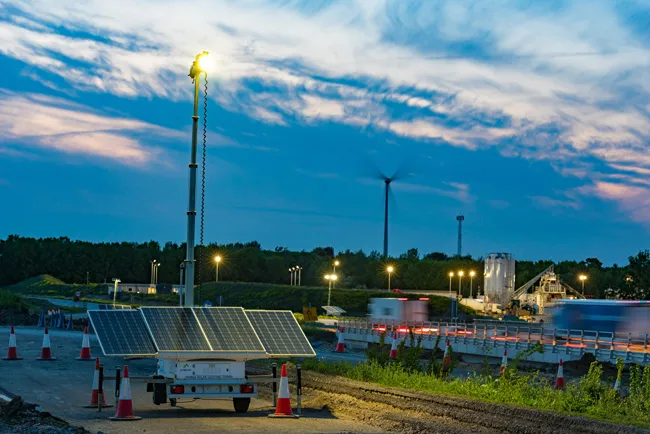
The A14 Cambridge to Huntingdon improvement scheme has become the first UK project to use temporary solar - instead of diesel - lighting.
The A14 is the UK’s biggest road construction project with a budget of nearly US$2 billion to upgrade 34km of trunk road between Cambridge and Huntingdon with completion set for December 2020. The A14 Integrated Delivery Team, working on behalf of project client Highways England, is the largest user in the country of year-round temporary solar trailer-transported lights.
A total of 24 Prolectric ProLight tower solar lighting with powerful LED illumination are deployed at the three compounds along the construction route, illuminating site operations.The ProLights illuminate two newly-constructed permanent roundabouts, enabling works traffic movements and site safety until permanent street lighting is introduced. Further lights are illuminating temporary bridges and laydown areas to enable safe loading and offloading of construction materials. The trailer-mounted battery capacity has been developed to be three times that of any other temporary solar trailer lights. On winter days with 16 hours of darkness the unit operates consistently.
A saving of 264,000kgs of CO2, 98,800 litres of diesel and just over €90,000 of manpower costs have been achieved in the past year. Using temporary solar lighting wherever possible will also save more than 1,000 tonnes of CO2 over the course of construction, explained David Bray, Highways England project director.
All ProLight solar units used on the A14 have been fitted with an upgrade that enables the works team to power 1800W hand-tools with the solar energy generated and stored in the light’s battery system.
The enhancement has increased the team’s ability to reduce carbon impact, as well as removing the noise and fumes of diesel generators.
The lights are fitted with a micro-controller and GPS that enables on and off times to be controlled automatically. Power usage and carbon savings data can be monitored and recorded via a web portal.
Although all customers have real-time web access to a remote monitoring service, Prolectric can also provide daily monitoring and control to optimise the performance of each unit, as well as regular reports of a range of performance data including carbon savings.








